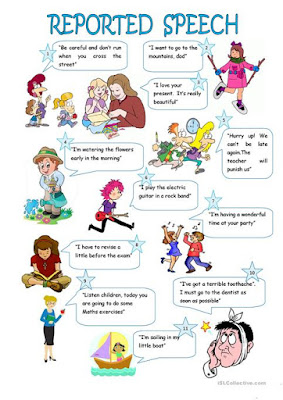VERB + ING OR VERB + INFINITIVE
VERB + ING OR VERB + INFINITIVE
After certain verbs we use the -ing form, and after
other verbs we use the infinitive. Sometimes we can use either form and there
is no change in meaning. Occasionally we can use either form and there is a
change in meaning.
So what’s the rule for whether we use the -ing form or the infinitive?
Sorry, there isn’t a rule. You have to learn which verbs
go with which pattern.
The verbs
followed by -ing include enjoy, mind, stop and recommend.
Los
verbos seguidos por - los ing (incluyen disfrute, importe, detenga
y recomiende.)
·
I told him
you really enjoy cooking.
·
Would you mind helping me?
·
It didn't stop raining all day yesterday.
·
Daisy recommends trying Alfie’s tiramisu.
The
negative is verb + not
+ -ing.
Imagine not having pizza! I eat it all the time.
Verbs
usually followed by –ing stop finish
imagine suggest
recommend avoid
mind miss risk
enjoy
detenga
el acabado imagine sugiera recomiende evita el riesgo de errada de mente
disfrute
·
I thought you could say: 'I recommend
that you see that film'?
·
Yes, you’re right, you can. But we’re not looking at the
more complex patterns with that or an object
today.
OK, what
about the verbs followed by the infinitive?
These
include decide, want,
promise, plan and forget.
Éstos incluyen decide, quiera, prometa, planee y se olvida.
·
She decided to go with Elliot instead.
·
I wanted to visit Rome.
·
She promised to take me there.
·
I planned to go to some real Italian restaurants.
·
She didn’t forget to phone.
The
negative is verb + not +
infinitive.
They decided not to make pizza.
Here are more verbs that are usually followed by
the infinitive:
Hope offer fail agree
forget manage learn afford
arrange ask expect
would like decide plan promise
want invite
What about the verbs that can be followed by either form?
These include start ,
begin , continue and bo th er.
It started raining. or It started
to rain.
Don’t bother waiting for me. or Don’t bother to wait for me.
Don’t bother waiting for me. or Don’t bother to wait for me.
The verbs like, love and hate can be followed
by -ing or the infinitive
when talking about repeated actions.
I love reading long novels. (British
English or American English)
I love to read long novels. (American English)
I love to read long novels. (American English)






Comentarios
Publicar un comentario